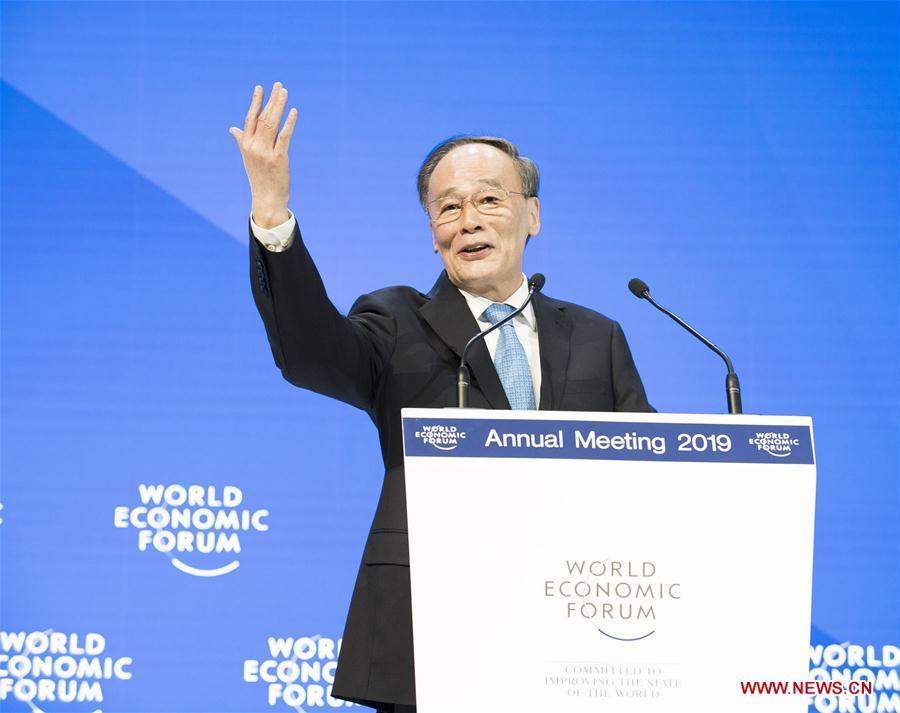Chinese vice president says economic globalization an inevitable trend
China's interests and future are closely linked to those of the world, and it wishes to work with all countries for common development and a community with a shared future for mankind, Chinese Vice President Wang Qishan has said.
China's interests and future are closely linked to those of the world, and it wishes to work with all countries for common development and a community with a shared future for mankind, Chinese Vice President Wang Qishan has said.
Chinese Vice President Wang Qishan addresses the 2019 annual meeting of the World Economic Forum in Davos, Switzerland, on Jan. 23, 2019. [Photo/Xinhua]
Delivering a keynote speech at the 2019 World Economic Forum (WEF) in Davos, Switzerland on Wednesday, Wang said "economic globalization represents an inevitable trend of history given the enormous potential that derives from harnessing the comparative advantages of countries and enhancing economic connectivity."
"In response to the problems and challenges in the world today, the international community needs to make a serious and in-depth analysis, and more importantly, take collective actions in line with the trend proactively," said the Chinese vice president.
Wang said that since the founding of the People's Republic of China in 1949, the country has witnessed remarkable achievements in its development over the past seven decades.
China's history, culture and philosophy are key to understanding what has made it possible for China to achieve so much in development and progress and how China will engage with the rest of the world, Wang said.
The Chinese vice president said that China has had an uninterrupted civilization for more than 5,000 years, and that the Chinese nation has both gone through sufferings and made splendid achievements.
Since the beginning of the modern era, the Chinese people have never stopped searching for paths to national renewal and prosperity. Eventually, the Communist Party of China rallied the Chinese people to achieve national independence and liberation, he said.
"We will stay true to the founding mission of the Communist Party of China," Wang said. "From the founding and building of the People's Republic to the launching of the reform and opening-up program and the shifting of focus to economic development, we have moved away from revolution to reform, from a planned economy to a market economy and from isolation to all-round opening up."
"Four to five generations of us Chinese have gone through twists and turns, probing a way forward," creating bright prospects for the great renewal of the Chinese nation, he said.
Drawing lessons from history, Wang said that the profound historical and cultural heritage of the Chinese nation is in the genes of its people, and that what China longs for is to see itself once again gain its rightful place among the nations of the world and achieve great rejuvenation.
"We are a peace-loving, open and inclusive nation that keeps abreast of the times," he said.
"The Chinese culture values the teachings that one should help others to succeed while seeking one's own success, create a world for all, treat others with respect and pursue win-win cooperation. We reject the practices of the strong bullying the weak and self-acclaimed supremacy," Wang said.
Wang said China, while developing itself, wishes to work with all countries for common development and for a community of a shared future for mankind.
He said that China's advances over the past 70 years have been made by the Chinese people through vision, hard work, courage, reform and innovation; and that China has embarked on the right path that fits its conditions and keeps with the trend of the times.
"This is a path we believe in, and we will steadily forge ahead along this path," he said.
Wang said that a targeted approach must be taken to address the problems that have emerged in the process of economic globalization and that development imbalances need to be resolved through further development.
"What we need to do is to make the pie bigger, while looking for ways to share it in a more equitable way," he said. "Shifting the blame for one's own problems onto others will not resolve the problems."
China's choice is to focus on managing its own affairs well, the vice president said, adding that China will pursue development as its top priority.
China will continue to carry out reforms and promote opening-up across the board; advance international cooperation within the framework of the Belt and Road Initiative; upgrade an open world economy; and work for a new type of international relations based on mutual respect, equity, justice and win-win cooperation.
Wang underlined that new technologies bring opportunities, but they also create risks and challenges. He called for working together to shape the global architecture in the age of the fourth industrial revolution with the vision to create a better future for mankind, and to uphold the security of all peoples while leaving a broad scope for the dissemination and application of scientific discoveries and technological innovations.
He called for accommodating, in a balanced manner, the interests of all countries, especially of emerging markets and developing countries, and for respecting national sovereignty and refraining from seeking technological hegemony or interfering in other countries' domestic affairs.
"We need to uphold multilateralism" so that all people can gain from technological innovation, and to uphold social equity and justice while ensuring that technological innovations are "guided by us humans, meet our needs and are compatible with our values," he said.
This year's Davos forum gathers global leaders to discuss "Globalization 4.0: Shaping a Global Architecture in the Age of the Fourth Industrial Revolution." More than 50 heads of state or government are attending the event.
While in Davos, Wang met with Ukrainian President Petro Poroshenko, Austrian Chancellor Sebastian Kurz, International Monetary Fund chief Christine Lagarde, WEF Founder and Executive Chairman Klaus Schwab, and President of the Brookings Institution John R. Allen. He also held discussions with international industrial and business leaders.


